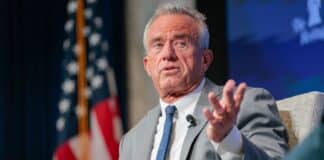As Donald Trump campaigned for his latest term, he labeled the Justice Department as a hub for biased prosecutors who had “weaponized” both law enforcement and the military, straying from their core missions for the sake of political propriety. He assured voters that his administration would rectify this, and his selections for leadership positions in the Defense and Justice departments, among others, indicate he intended to follow through on those promises.
Following his recent victory, Trump has chosen trusted associates to advance his agenda, aligning with the commitments made during his campaign. If Matt Gaetz secures Senate approval, he would assume the role of attorney general, thereby potentially ending the Justice Department’s historic independence from the Executive Branch and transforming it into a tool for Trump’s political strategies.
“President Trump is going to hit the Justice Department with a blowtorch, and Matt Gaetz is that torch,” remarked Steve Bannon, formerly part of Trump’s White House team, in an interview with NBC News. Gaetz has since resigned from the House of Representatives.
Another of Trump’s picks is Pete Hegseth, a former host on Fox News, who could become the defense secretary responsible for potentially purging military leadership deemed unfavorable to Trump’s vision of military dominance. Additionally, the former congresswoman Tulsi Gabbard, who has distanced herself from the Democratic Party, is set to take on the role of national intelligence director, despite lacking extensive qualifications in the field.
For immigration, Trump selected Tom Homan, a staunch former immigration official, as his border czar, and Kristi Noem, the Governor of South Dakota, for the homeland security secretary position. Their confirmations would be pivotal to Trump’s ambitious plan to dramatically increase the deportation of undocumented immigrants.
In swift succession, Trump’s transition team has unveiled a series of Cabinet nominations, seeking to rapidly establish an administration that can leverage the electoral success he achieved, a stark contrast to the less decisive mandate he had in 2016. A notable shift this time is his preference for familiar individuals he trusts, rather than seasoned professionals with impressive qualifications from outside his inner circle. In his previous term, he appointed James Mattis, a retired four-star general, as defense secretary, a position he later filled with John Kelly, another retired general whose experiences shaped perceptions of military leadership.
However, Trump ended his associations with both Mattis and Kelly, underscoring his preference for loyalty over prior military experience, and has since moved to a different model as he prepares for a new term.
The announcements of Gaetz and Hegseth have sparked criticism, especially regarding their qualifications for leading such complex government departments. Hegseth, while holding a long history of military service, has not managed a large organization comparable to the Department of Defense.
A Trump transition official defended Hegseth, describing him as “perhaps unorthodox to inside-the-Beltway types [but] exactly the kind of young, talented, new thinker that can execute for DJT [Donald J. Trump] with lessons the president learned from his first term.” However, critics argue that experience is essential for such critical positions. Max Stier, chief executive of the Partnership for Public Service, emphasized, “You need two things: competence and character. You need people who have deep, large, organizational experience, ideally with the public sector. We’re not seeing that with these picks.”
Gaetz has been under scrutiny due to allegations concerning his involvement in sex trafficking involving a minor. Although the investigation did not yield charges, he maintains his innocence. Comments from within the Justice Department regarding his nomination included remarks that it was “truly stunning” and at times even “insane.”
Despite the mounting criticism, Trump has not shown any intention of wavering. His recent win against Democrat Kamala Harris was decisive, placing his party in control of both the House and Senate and giving him latitude in assembling his administration. However, he may face challenges in securing unanimous backing from Senate Republicans for Gaetz’s confirmation. Senator Lisa Murkowski expressed doubts regarding Gaetz’s suitability as attorney general, while Senator Kevin Cramer labeled him “a long shot.”
Trump, having learned from his experiences in his first term, understands the necessity of having an attorney general he can wholly rely on, making it worthwhile to invest political capital in Gaetz’s confirmation fight. Little frustrated him more during his first term than Attorney General Jeff Sessions’ decision to recuse himself and facilitate the appointment of a special counsel to investigate potential links between Trump’s 2016 campaign and Russia. According to a report from the special counsel, Robert Mueller, Trump remarked, “This is the end of my presidency. I’m f—–.”
He subsequently dismissed Sessions and encountered further conflict with William Barr, another appointee who brought him disappointment by asserting that the 2020 election was not stolen, countering Trump’s claims. With Gaetz as attorney general, Trump would gain a trusted ally who shares his belief in the legitimacy of the election results.
“I don’t care if it takes every second of our time and every ounce of our energy,” Gaetz said at a conservative activists’ conference last year. “We either get this government back on our side or we defund and get rid of — abolish the FBI, CDC, ATF, DOJ, every last one of ’em if they do not come to heel.”
Regarding the potential for Gaetz’s confirmation in the Senate, an insider noted, “The American people made clear that they want President Trump to remake Washington, and Rep. Gaetz is the perfect man to restore the DOJ to greatness. Senators will hear from their voters who support the congressman.”





